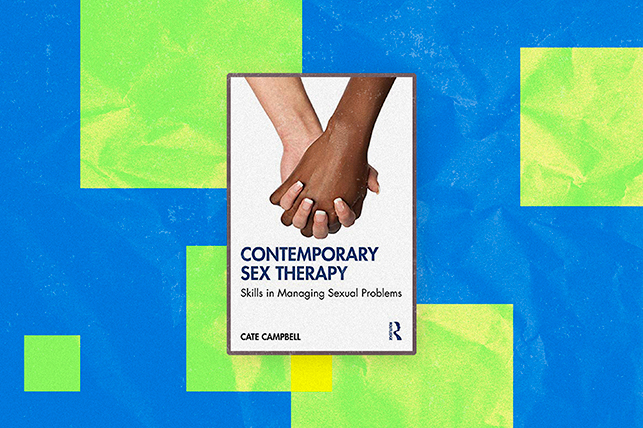Between the Pages: 'Contemporary Sex Therapy' Updates Old Approaches

Cate Campbell's book "Contemporary Sex Therapy: Skills in Managing Sexual Problems" explores sexuality and the uniquely 21st-century issues facing sex therapists today. The author, a relationship and psychosexual therapist based in the United Kingdom, provides a comprehensive approach to sex therapy as she demonstrates how to address problems with sex and intimacy, among them erectile difficulties, loss of desire, orgasmic dysfunction and more.
Campbell spoke with Giddy about the impetus for the book, the importance of understanding a patient's history, misunderstandings about the orgasm and more.
Editor's note: This interview has been edited for length and clarity.
How did your background in sexual health lead you to write 'Contemporary Sex Therapy'?
Campbell: I've been a relationship therapist, and became a sex therapist, and then became a lecturer for relationship and sex therapy. I wrote this book because I was teaching a course on contemporary sex therapy.
Basically, I was thinking, "Oh, we need a textbook" which looks at the sex therapy process from beginning to end in lots of detail. But it's a more modern version of the [pioneering sex researchers] William H. Masters and Virginia E. Johnson approach to sex therapy. We've moved on quite a lot since then.
The Masters and Johnson way of doing sensate focus is quite stressful for people. I think we now realize anxiety is a major cause of sexual problems.
In the first part of Masters and Johnson's sensate focus, it's very chill and there's no pressure. But for the second part, there's enormous pressure. I think we recognize now that if you take the pressure off throughout and get people to recognize their own responsibility for their own sexual pleasure, they actually are better able to give one another sexual pleasure and relax and be present during the experience.
This book takes the pressure off performance completely, which is fun. I think in recent years, we've had some improvements in psychotherapy.
What are some of the uniquely 21st-century issues facing sex therapists?
We're looking at issues such as female genital mutilation, gender issues and polyamory. People's sexual image is much more important to them, and they're much more likely to explore.
There are a lot more issues with dating. When I started, we were only looking at things like sexual problems, things that were in the DSM [Diagnostic and Statistical Manual of Mental Disorders]. And now it's spread out much more [to] things like sexual compulsivity and worries about relationships and dating.
Some people have a compulsive preference for the early part of the relationship where they become bored once they get beyond the honeymoon period. And that's becoming much more common.
People are more sexually adventurous. So there's more interest in kink, anal sex and polyamory. When I started training, everything was very mainstream and straight. That's not the case anymore at all. We don't have such stereotypical ideas of people, either. Sex therapy was always a bespoke process, but even more so now.
What is PST in a nutshell?
PST is psychosexual therapy. In the U.K., we talk about psychosexual therapy because we don't see it as all about going through a series of behaviors and being fixed. We want to focus on what's going on in people's heads as well as their genitals.
The psychology bit is about anxiety and what has led up to this. I spend a fair bit of time on that in the book and talking about trauma.
Why is history-taking so important in sex therapy?
It's the assessment phase of sex therapy, where you ask for information in tremendous detail about each partner's previous sex life. Collect lots of information about them, their family and their relationship. I generally take about three hours for each partner. So you've got real detail about them, about their resilience, about their attitudes to sex, about the cultural ideas they have, how religion affects them, their sexual preferences and their trauma experiences.
When you ask these questions, you're building up quite a close relationship with each partner because you're seeing them individually. By the time you get to the next stage, which is where you talk about what you've discovered, you often feel you know both quite well. This allows the therapist to anticipate problems they might have going forward with the actual therapy, and you can also explain to them why they would, as a couple, have these problems. It gives you a way to formulate their issues and discuss them.
We see sex therapy as a step process. People can step off at any point. Some people you see for just one session. And sometimes there are suggestions you can make or information you can give which is enough, and they can go off and be happy. And some people step off after the history-taking process, because the questions are not just there for the therapists' interest, they're there for the clients to really think about what's going on for them. And, often, that's enough.
You write that orgasms are often misrepresented and misunderstood. Do you find that you have to educate clients about orgasm and adjust their expectations?
Some people have difficulty achieving orgasms, and they feel it's an achievement. Some people have orgasms too quickly or take too long, and those are issues we've always dealt with. But I think there's a great deal of expectation about things like that. Getting an erection and keeping an erection and climaxing are all very important, so orgasm has this outcome.
We've made men sensitive, perhaps, and better lovers. And when there's an expectation that men will please and satisfy women, in terms of straight relationships, there's become much more response pressure. I think maybe in some gay relationships, too, there's an expectation that if you're trying to please someone that they hurry up and be pleased so that then you can breathe a sigh of relief, and you can both feel you've pleased one another. This creates huge pressure.
It's not just performance anxiety, but response pressure. That's one of the main issues we see with orgasms, and if you take the pressure off and people are responsible for their own pleasure, they make sure they have their own orgasms. That can be by asking what they want or pleasing themselves, [and] then they tend to relax more, which allows for it to come more easily.
There's a chapter on 'Physical Obstacles.' People may think if something physical is causing their sexual problems, they may not need psychosexual therapy. How can PST help with physical issues?
Well, something's got in the way of sex, and you start to worry about it. And so anxiety kicks in. It's very unusual to have had a physical problem where there aren't some psychological repercussions. And that's where we can be really helpful.
Often, you'll find sex therapists working with teams of physiotherapists and neurologists and gynecologists. They will have access to each other sometimes in clinical settings and in private practice. Lots of practitioners have access to a wide range of other professionals so they can help one another.




















